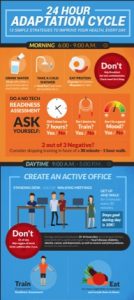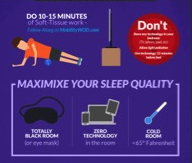Although the world is full of suffering, it is also full of the overcoming of it.
– Helen Keller
Read time: 12 minutes
TL;DR Key Points:
- Stress is not your destiny. While it is part of modern life, it can be effectively addressed
- There are a variety of body, breath and mind techniques that can be useful. Find what works for you
- A 1% improvement daily would make you one of the most empowered people on the planet in the matter of 3 months.
- Being Hangry is probably the ultimate stress. I repeat, DO NOT surf Postmates when hangry! Have a snack and wait till the beast has subsided to order online.
- Yes, yes I like Love Actually
Return To:
Part 1: Gut Feelings: Stress and the GI Tract
Part 2: Stress and the Gut in Everyday Life
Wear and Tear: Stress in Our lives
As you recall we’ve discussed the emerging neuro-gastroenterology paradigm of gut health as it relates to stress. For a refresher, click the links above to review how our guts and our brains are intimately connected with each other. Understanding this cross-talk lays the context for the discussion below.
The gut-brain axis can be used to optimize gut health in two ways: brain oriented approaches and gut specific therapies. We will focus on the former in this article.
The Value of Self-Care
If you missed one day of work without explanation, your boss would bring you into her office and you may risk your job. Self-care has to be a similar priority. Make the commitment to yourself.
There is a distinction between self-care and self-indulgence. Self-care tips like meditation, yoga, listening to music, bubble baths (or whatever you’re in to) are valuable ways to “get you back on the (allostatic) curve” so to speak. Self-indulgence, on the other hand, like eating highly sugary foods is more often about distraction or pure entertainment and does little to enhance health. Physical activity, meditation, breath work can actually reduce stress but processed foods simply minimize it (temporarily).

Self-care is critical because IBS and similar functional bowel disorders are primarily patient centered illnesses. There is little a physician can do to tip the balance in your favor unless you take a central role in its management.
Moreover, many of us live in a disease promoting environments. In the absence of efforts to overcome this, all of us naturally tend to develop illnesses, minor health challenges, and formal medical problems. So it is up to us to engage in self-corrective behaviors and strategies, much like a captain overshooting directing her sailboat to capitalize on the wind.
Pay yourself first. The world will be as it is, but we can focus on enhancing our own internal strength.
Stress and the Training Cycle
First, if you have acutely negative stressors in your life it is important you tell your provider about them. For example, unfortunately, domestic abuse is prevalent in the US and underlies a lot of functional bowel complaints as well as other health concerns. Extricate yourself from a dangerous environment whenever possible. (It does bear mentioning that some examples, like abuse, are often both acute and chronic).
For more chronic day-to-day stress, understand the 24-hour adaptation cycle. Sleep, exercise, nutrition, stress relief all operate in a cycle that influence and performance. Kelly Starrett of the Mwod website speaks of this regularly. While he works with athletes, it has applications for people with stress induced gut problems.
In other words, we should all think and act like athletes: Train –> Recover –> Enhance


Photo Cred: https://www.mobilitywod.com/infographic/24hr-adaptation-cycle/
Look for 1% improvements you make in these different areas. Can’t sleep at night? Try an eye mask, an iphone app, or a white noise machine. Observe and track the difference. Struggle with stress relief? Schedule a 5-minute meditation with yourself everyday, no questions asked. These things add up and have spillover effects in the other areas of your life.
General Principles
1. Manage your energy not just your time – Living and dying by the to do list is not an effective or even happy way to live life. Yes, we all have things to do but we need to emphasize self care (see above). Paying ourselves first means that self-care is at the top of our to do list (yes, even before email). It is the resource that makes all other activities possible.
On this front, focus on your understanding your own patterns of energy throughout the day. When are you most mentally sharp? When do you feel the need to take a break? The science of circadian rhythms has been exceptionally popular as of late (even recently was the basis for the Nobel Prize in Medicine). Much of these patterns are genetically primed.
On a practical level, try to consolidate your activities and time them based on your natural peaks and valleys in energy. Your most demanding activities should be done at your top level of focus. Save less cognitive or physically strenuous activities for your downtime moments.
2. Don’t go it alone – The happiest people with those meaningful lives have strong social support systems (4 S’s in a row, yahtzee!). This was most notably seen in the Harvard Rely on community. Loneliness and social isolation is an epidemic, especially for millenials who have been raised in the technologically driven environments but at times at the expense of real human interaction. Try to find support groups or connect online. It may change your experience of your symptoms.
3. Social Context, again – Health Behaviors spread along social networks. This has been seen in smoking, obesity and adherence to cancer prevention behaviors. We refer to this as “network medicine,” and it often colloquially is referenced in the phrase that “we are the sum of the five people we spend the most time with.” There is definite truth to this so I encourage you to reach out to people that share health goals or suffer from similar conditions.
4. Optimize your State – Why should people never make major decisions at airports? (The movie Love Actually not withstanding) It is because people are stressed, hangry!, in a rush, carrying luggage, and upset at the personal violation they just experienced at TSA.. Their blood pressure is elevated, cortisol is at high levels in their blood stream and all many people think is how quickly can they get an inflight jack and coke. In other words, their state is disturbed. A person’s state is the gestalt of their physio-emotional condition that reflects bodily and psycho-affective (read: thoughts and feelings) patterns occurring at a given moment.
While treatments continue to be researched for IBS, it helps to emphasize things we can influence, namely the state of being that we have when we experience GI distress.
As Tony Robbins talks about, state is determined by physiology, language, focus. This has correlates with the “GI Triad” discussed in the last blog post. Internal narratives and emotions strongly influence gi symptoms so it is a valuable lever to use for potential relief of such complaints.
5. It’s ok to feel vulnerable – Being vulnerable and sick is part of the human condition. There is no shame in it. Just because stress is to central to understanding conditions like IBS does NOT mean that a person caused it. And yet, people’s bowels are a sensitive, decidedly unsexy topic. It is difficult to talk about it and a lot of that is due to social stigma that absolutely can impede the healing process.
Yes, I am veering dangerously into Oprah territory but there is truth here. I encourage you to look into the work of Brene Brown, social worker theorist extraordinaire, for more insight into this topic.

6. Re-frame – Many of my patients have taught me the particular value of re-framing. The thoughts we have in our head about our gut problems can in turn make them worse. So invite you to challenge your own thinking if you find yourself lost in thoughts that are not constructive. No, you’re not to blame for your conditions. This doesn’t only happen to you. It is not the end of your regular life. And this doesn’t happen all the time.
These concepts are some of the central pillars of the bio psycho-social model of health and of cognitive behavioral therapy.
In fact, a recent study from the University of Buffalo found robust effects of CBT to treat IBS. Prior work has shown that gut directed hypno-therapy can match a low FODMAP diet for improvement in symptoms of IBS.
7. Down-regulate – We exist in a world that seeks to have more energy. There are advertisements for energy shots, energy drinks, caffeine pills (even gum!), and now nootropic supplements to cognitively enhance themselves. It seems like we can’t get enough. There may be a time and place for these items but I would advocate for rest, recovery and recuperation. The emphasis on energy further ramps up the sympathetic nervous system, which is not the primary state we want to be utilizing. It’s all go! go! go! without stopping. No one needs that much fight or flight (or freeze) in his or her system.
Yoga, breath work, sensory deprivation tanks, tai chi, meditation, massage therapy, hypnotherapy – all of these strategies are effective ways to up regulate para-sympathetic autonomic nervous system (“rest and digest”). This is the value of certain complementary medicine treatment modalities for patients suffering from distressed guts. It is worth noting that these techniques still need to be much more formally researched but careful experimentation with some of these strategies may help.
References
[1] Peters SL et al. Randomised clinical trial: the efficacy of gut-directed hypnotherapy is similar to that of the low FODMAP diet for the treatment of irritable bowel syndrome. Aliment Pharmacol Ther. 2016 Sep;44(5):447-59. doi: 10.1111/apt.13706. Epub 2016 Jul 11.
[2] Sensory Deprivation Tanks https://www.npr.org/sections/health-shots/2017/10/16/554063496/floating-away-your-anxiety-and-stress
[3] What Makes Us Happy? The Atlantic June 2009. https://www.theatlantic.com/magazine/archive/2009/06/what-makes-us-happy/307439/
[5] Brene Brown https://www.ted.com/talks/brene_brown_on_vulnerability
[6] Ballou S, Keefer L. Psychological Interventions for Irritable Bowel Syndrome and Inflammatory Bowel Diseases. Clinical and Translational Gastroenterology. 2017;8(1):e214-. doi:10.1038/ctg.2016.69.
[7] Psychological treatments for the management of irritable bowel syndrome. Cochrane Database Syst Rev. 2009 Jan 21;(1):CD006442. doi:
10.1002/14651858.CD006442.pub2.
[8] Christakis N, Fowler J. The Spread of Obesity in a Large Social Network over 32 Years. N Engl J Med 2007; 357:370-379 DOI: 10.1056/NEJMsa066082
[9] Lackner J et al. Improvement in Gastrointestinal Symptoms After Cognitive Behavior Therapy for Refractory Irritable Bowel Syndrome. Gastroenterology April 2018.